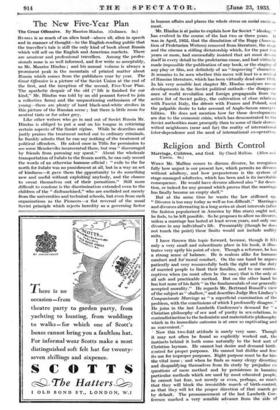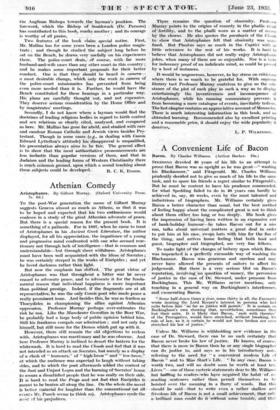Religion and Birth Control
WHEN Mr. Mullins comes to discuss divorce, he recognises fully how unjust is our present law, which permits no divorce without adultery, and how preposterous is the system of Stage-managed adulteries, which has been and is its inevitable consequence. He would have divorce allowed also " for deser- tion, or indeed for any ground which proves that the marriage has finally become an empty shell."
But at the same time he wants the law stiffened up. " Divorce is too easy today as well as too difficult." Marriages and divorces alternating in a long series at short intervals (after the fashion popularized in America by film stars) ought not, he feels, to be left possible. So he proposes to allow no divorce, unless a marriage has lasted at least seven years, and only one divorce in any individual's life. Presumably (though he does not touch the point) these limits would not include nullity suits.
I have thrown this topic forward, because, though it fills only a very small and subordinate place in his book, it illus- trates very aptly his point of view. Though a reformer, he has a strong sense of balance. He is zealous alike for humane conduct and foemoral- conduct. On the one hand he argues patiently and very resourcefully both the right and the duty of married people to limit their families, and to use contra- ceptives when (as must often be the case) that is the only at all safe and practicable method. But on the other hand he has lost none of his faith " in the fundamentals of our generally accepted morality." He regards Mr. Bertrand Russell's view of the subject as "-shallow," and describes Judge Ben Lindsey's Companionate Marriage as " a superficial examination of the problem, with the conclusions of which I profoundly disagree." He joins in the last Lambeth Conference's demand for " a Christian philosophy of sex and of purity in sex-relations, in contradistinction to the hedonistic and materialistic philosophy which in its immediate outcome is at once so captivating and so convenient."
' Now this two-fold attitude is surely very sane. Though it may not often be found so explicitly worked out, the instincts behind it both come naturally to the best sort of Christian layman. He cannot but desire and demand birth- c3ntrol for proper purposes. He cannot but dislike and fear its use for improper purposes. Right purpose must be for him the Vital issue ; and when he finds so many clergy diverting and disqualifying themselves from its study by prejudice cn questions of mere method and by persistence in banning particular methods which are used by most educated people, he cannot but fear, not merely or even, perhaps, so much that they will block the irresistible 'march of birth-control, as that they will let the proper direction of that march go by default. The pronouncement of the last Lambeth Con- ference 'marked a very sensible advance from the side of
-the Anglican Bishops towards the layman's position. The foreword, which the BishOp of Southwark (Dr: Parsons) has contributed to this book, marks another ; and its courage is worthy of all praise, • • Two features of the book claim special notice. First, Mr. Mullins has for some years been a London police magis- trate ; and though te studied the subject' long before he sat on the Bench, he draws very usefully on his .experiences there. The police-court deals, of course; with •-far more husband-and-wife cases than any other court in this country ; and he makes some important proposals for their better conduct. One is that they should be heard in contem- n most desirable change, which only the work in camera of the police-court missionaries has prevented from being even more needed than it is. Further, he would have the Bench constituted for these hearings in a particular way. His plans are carefully thought but, and not expensive. They deserve serious consideration by the Honie Office and by magistrates' meetings.
Secondly, I do not know where a layman would find the -doctrines of leading religious bodies in regard to birth control and sex relations so clearly cited, analysed, and compared as here. Mi. Mullins has gone far afield, and studied withcare and candour Roman Catholic and Jewish views besides Pro- testant. Though in some cases (e.g., in dealing with Canon Edward Lyttelton's attitude) his disapproVal is unqualified, his presentation always aims to be fair. The general effect is to show that the most authoritative pronouncements are less inelastic than popular versions of them, and that in Judaism and the leading forms of Western Christianity there is much common ground, upon which a sound teaehing about these subjects could be developed. R. C. Ii. ENSOR.









































 Previous page
Previous page